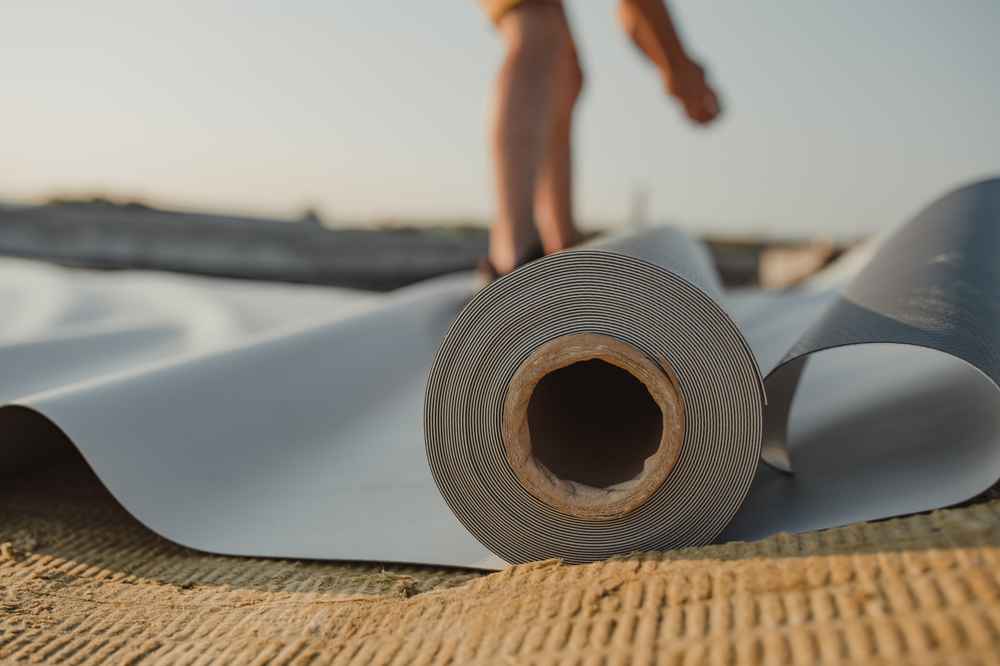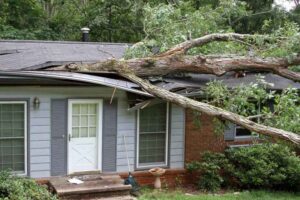If you’ve ever looked out over the rooftops in Bethany Beach, DE—whether it’s beachfront homes, condo buildings, or local businesses—you’ll see a common trend: a lot of flat or low-slope roofs.
Flat roofs are great for space efficiency and modern design. But when you live along the Delaware coast, the real test isn’t how the roof looks—it’s how well it holds up to salt air, strong winds, standing water, and heat.
That’s where choosing the right flat roof material makes all the difference.
Many property owners narrow it down to two options: TPO roofing and PVC roofing. At first glance, they seem pretty similar. They’re both white, energy-efficient membranes installed in sheets and welded at the seams. But when you dig into how they perform in coastal climates, the differences start to matter—especially when it comes to lifespan.
What You’ll Learn in This Blog:
- What TPO and PVC roofing actually are (in plain terms)
- How each system handles Delaware’s coastal weather
- Which flat roof material lasts longer in Bethany Beach and why
- What to consider before making a decision
- Pros and cons of TPO vs. PVC roofing based on real-world experience
- Answers to common questions from local property owners
Need help with a flat roof decision? Grand Exteriors can help.

What Is TPO Roofing? (And Why It’s So Common)
TPO (Thermoplastic Polyolefin) is a single-ply white roofing membrane made from a blend of rubber and plastic. It’s commonly used on flat roofs because it reflects sunlight (which reduces cooling costs), weighs less than many other systems, and is cost-effective to install.
TPO roofing is especially popular for residential buildings, multi-family housing, and commercial spaces that want energy efficiency without breaking the budget. If you’ve been Googling “what is TPO roofing,” here’s the bottom line: it’s a modern, flexible flat roof system with solid performance and lower upfront costs.
What Is PVC Roofing? (And Why It Handles Coastal Weather Better)
PVC (Polyvinyl Chloride) is another type of single-ply membrane roofing—but it’s built a bit tougher. While it’s also white and reflective, PVC roofing is more chemically resistant, more flexible in cold temperatures, and generally lasts longer under harsh conditions.
PVC has been used for decades on coastal and commercial buildings. It handles salt spray, ponding water, grease, and UV exposure better than most other flat roofing materials.
Why Flat Roof Materials Perform Differently in Bethany Beach, DE
Living near the ocean is great—but your roof doesn’t always love it. Here in Bethany Beach and across coastal Delaware, flat roofs face a unique set of challenges:
- Salt air can degrade roof membranes faster than inland areas
- High humidity and heavy rainfall increase the risk of ponding water
- Wind uplift from storms can stress seams and edges
- Direct UV exposure shortens the life of weaker roofing products
These aren’t “what-ifs”—they’re year-round realities for property owners along the Delmarva coast. That’s why roofing material matters more here than in other parts of the country.
What to Think Through Before Choosing TPO or PVC
Solution Prep: Smart Questions to Ask Before You Buy
Before you commit to either system, take a few minutes to consider:
1. Budget vs. Longevity
- TPO roofing is usually the more affordable option upfront
- PVC roofing has a higher initial cost but typically lasts longer and requires fewer repairs
2. Building Type
- For homes or small flat roof systems, TPO can be a solid, economical choice
- For buildings near saltwater, with poor drainage, or with commercial exhaust systems, PVC is often the better long-term bet
3. Drainage and Roof Design
Flat roofs that don’t drain well are more likely to suffer from early material failure. PVC handles ponding water better than TPO.
4. Local Permits & Code
In Bethany Beach and other Delaware towns, flat roof replacements usually require permits. Certain energy codes also require reflective materials—both TPO and PVC qualify. Don’t worry—Grand Exteriors handles all permitting for you.
TPO vs. PVC: Which Lasts Longer in Delaware’s Coastal Climate?
Now let’s get practical. Here’s how TPO and PVC roofing systems compare when installed in areas like Bethany Beach, DE.
| Feature | TPO Roofing | PVC Roofing |
| Average Lifespan | 15–25 years | 20–30 years |
| Salt Air Resistance | Moderate | High |
| Resistance to Ponding Water | Moderate | Excellent |
| Wind Resistance | Good | Excellent |
| UV Resistance | Good | Excellent |
| Upfront Cost | Lower | Higher |
| Maintenance Over Time | Moderate | Lower |
| Repairs & Weldability | Requires care | Easier to repair |
So, Which One Lasts Longer?
In our experience at Grand Exteriors, PVC roofing tends to last longer and perform better on coastal flat roofs. It’s more resistant to salt, handles standing water well, and has stronger heat-welded seams.
That doesn’t mean TPO is a bad choice. For the right property, it can be an efficient and affordable solution—especially if your roof is well-drained and not exposed to excessive salt or grease.
What We’ve Seen on the Roof: Real Talk from Grand Exteriors
We’ve worked on flat roofs across Bethany Beach, Rehoboth, Milford, and the greater Delmarva area. Here’s what we’ve seen play out over time:
TPO Roofing Wins When:
- The budget is tight but you still want energy efficiency
- The roof is small, simple, and drains well
- You’re working on a residential or non-commercial property
PVC Roofing Wins When:
- You’re near the beach or water
- You want the longest lifespan with the fewest repairs
- Your building has HVAC, kitchen, or industrial exhausts
- The roof holds water after rainstorms

Common Questions About TPO and PVC Roofing in Coastal Delaware
If you’re comparing flat roofing options and trying to decide between TPO and PVC systems, you’re not alone. Here in Bethany Beach and throughout coastal Delaware, these are some of the most common questions we get from homeowners and property managers looking to install or replace a flat roof.
Is PVC roofing better than TPO near the ocean?
Yes, PVC roofing is better than TPO near the ocean because it resists salt exposure, standing water, and UV rays more effectively. In coastal climates like Bethany Beach, PVC tends to hold up longer and require fewer repairs over time.
What is TPO roofing and why is it so common on flat roofs?
TPO roofing is a single-ply membrane used on flat and low-slope roofs because it’s cost-effective, energy efficient, and relatively easy to install. It’s commonly chosen for residential flat roofs in Delaware thanks to its reflective surface and competitive pricing.
How long does a PVC flat roof last?
A PVC flat roof typically lasts 20 to 30 years when properly installed and maintained. Its long lifespan, especially in high-moisture and high-salt environments, makes it a smart investment for coastal homes and commercial buildings.
Can TPO roofing handle the weather in Bethany Beach?
Yes, TPO roofing can handle the weather in Bethany Beach if it’s installed correctly and the roof has good drainage. However, it may wear out faster than PVC in areas with frequent salt exposure or ponding water.
Can flat roofing be installed during the winter months?
Yes, flat roofing can be installed during the winter months as long as the temperature stays above 40°F for proper seam welding. Winter installations can also offer shorter wait times and more flexible scheduling.
Do I need a permit to replace a flat roof in Bethany Beach?
Yes, you do need a permit to replace a flat roof in Bethany Beach and other Delaware towns. At Grand Exteriors, we handle all permitting and code compliance so you don’t have to worry about the paperwork.
Pick the Roof That’s Built for the Coast
Choosing between TPO and PVC roofing isn’t just about cost—it’s about how well your flat roof will stand up to life on the coast. Around here, that means salt, humidity, UV, and storms.
- If you want upfront savings and have a well-designed roof with good drainage, TPO may be the right fit.
- If you’re after longevity, fewer repairs, and peace of mind, PVC is almost always the smarter investment, especially in Bethany Beach, DE.
At Grand Exteriors, we install both—and we’ll tell you honestly which one makes more sense for your specific roof. No upsells. No shortcuts. Just roofing that’s built to last.
Schedule your free flat roof inspection today and let’s get your roof ready for the coastal elements.




